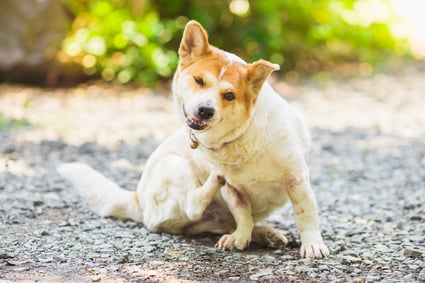Just like people, dogs can show allergic symptoms when their immune systems begin to recognize certain substances or allergens as dangerous. These allergies can be problematic when inhaled, ingested or contact a dog’s skin. As the body tries to rid itself of these substances, a variety of skin, digestive and respiratory symptoms can appear.

What are some general allergy symptoms in dogs?
- Itchy, red or moist scabbed skin
- Increased scratching
- Itchy, running eyes
- It’s base of tail
- Itchy ears and ear infections
- Sneezing
- Vomiting
- Diarrhea
- Paw chewing and swollen paws
- Constant licking
What substances can dogs be allergic to?
- Tree, grass and weed pollens
- Mold
- Dust
- Dander
- Feathers
- Cigarette smoke
- Food (e.g. beef, chicken, pork, corn, wheat or soy)
- Prescription drugs
- Fleas and flea products
- Perfumes
- Cleaning products
- Fabrics
- Rubber and plastics
What should you do if you think your dog has allergies?
If your dog seems to have an allergic condition, it’s important to get an appointment with your veterinarian as soon as you can. Your veterinarian will be able to determine the source of your dog’s allergic reaction with a physical exam, blood tests or skin tests.
How can dog allergies be treated?
The best way to treat allergies is to remove the allergens from the environment.
Prevention is the best treatment for allergies caused by fleas. Starting a flea control program prior to the start of the season is a good idea. And remember, outdoor pets can carry fleas to indoor pets. Be sure to talk to your veterinarian about the best flea medication for your dog.
If your dog is allergies to dust, clean your pet’s bedding once a week and vacuum rugs, curtains and other objects that gather dust.
A weekly bath may help to sooth your dog’s skin. Talk to your veterinarian about the best medicated shampoo and frequency of bathing, as over bathing can cause dry and irritated skin.
If a food allergy is suspect, your pet will need to be put on a restricted diet, prescribed by your veterinarian, to clear symptoms. After a period of time, you will reintroduce old foods to determine which foods may be causing the allergy.




